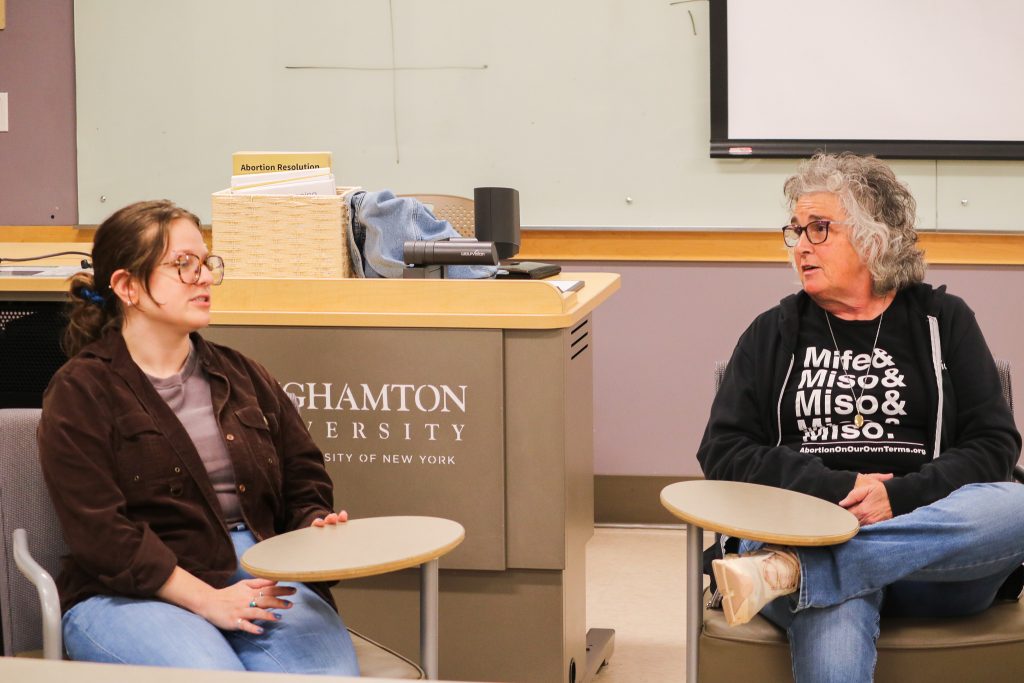Southern Tier Women’s Health Services, a reproductive health clinic in Vestal, seeks to provide a haven for those in need of abortion care and other related services. Providing care to patients since 1981, the clinic offers pregnancy testing, gestational ultrasounds, miscarriage management and STD testing.
Family Nurse Practitioner Susan “Sue” Seibold-Simpson ‘83, M.S. ‘88, has worked at the clinic for 36 years. She earned a Ph.D. in health practice research from the University of Rochester in 2009 and her Master’s in Public Health from the University at Albany in 2010. She served as the deputy director of the Broome County Health Department and as chair of SUNY Broome’s nursing program, seeing countless patients for sexual and reproductive health.
The clinic serves patients from the North Country region of New York to northeastern Pennsylvania. Following the overturning of Roe v. Wade, many women living in states with stricter abortion restrictions and bans cross state lines to receive care. Bella Grieco, a clinic assistant, pathology technician and a Binghamton University alumna, said the number of out-of-state patients has increased since Roe fell. Restrictions in Pennsylvania have caused many of its residents to turn to New York providers like Southern Tier Women’s Health.
“We do track where our patients come from,” Seibold-Simpson said. “We’ve had patients from Texas, patients from Florida, patients from Georgia. When you get into Pennsylvania, the closest place is gonna be Allentown from where patients can get care. And in PA., you have to have 24-hour counseling and you have to have parental consent if you’re under 18. So, there are greater barriers to get abortion care in Pennsylvania.”
While abortion is legal in New York and the state government has continued to support efforts to increase accessibility and promote patient and doctor safety, social stigma still exists. Combating this was a major objective of the clinic’s founder, Margaret “Peg” Johnston. Following her death in May 2023, members of the community have continued looking for ways to reduce this stigma and shame.
Grieco said that many feel anxiety about the upcoming election, which could shape the future of abortion access in the United States. This anxiety is especially prominent among older generations of nurses who feel the nation is moving backward.
“I know a couple of the nurses who work at the recovery room, [and] they ask every single person if they are registered to vote yet,” Grieco said.
Seibold-Simpson said stereotypes surrounding those who receive abortions ignore that many people need this care. She mentioned the variety of patients she has seen — from a woman in her 40s who did not think she could get pregnant to a 14-year-old girl who did not have access to educational resources before becoming sexually active. Issues of race, ethnicity, culture and resource access often intersect with abortion care. The clinic is inclusive of transgender patients.
Grieco and Seibold-Simpson are involved with SHIFT, an outreach program focused on changing attitudes toward abortion, birth control and bodily autonomy. They are partnering with Family Planning of South Central New York, the Southern Tier Aids Program, the Rural Health Network, the Urban League and the BU’s Abortion Advocacy Coalition to reduce stigma by holding information sessions centering art, like books and films, to help people have difficult conversations.
“We can rattle off the facts and the statistics all day long,” said Margaret Giordano, the coalition’s president and a senior majoring in psychology, said. “But it is another thing entirely to witness a piece of art and really have that experience of putting yourself in that person’s shoes. It really does force you to consider the nuance and the humanity that often gets left out of just the numbers.”
The clinic tries to understand and connect with every individual who visits. Aware that many students in the area may not have a support system, it provides counseling and support for all patients. They also work with conflicted patients to help them reach the right decision for themselves, providing resources like a pregnancy option workbook Johnston created.
“We really love what we do,” Seibold-Simpson said. “And it’s not grim or dark — you will hear grim stories because those are the ones that stick out. But day in and day out, we love what we do.”



